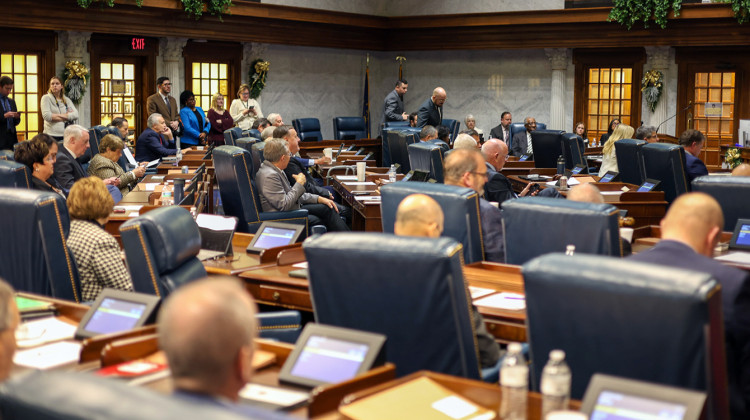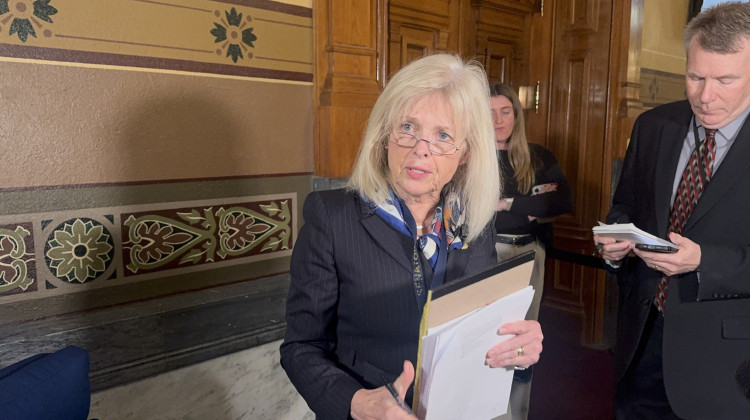Editors note: This piece is part of WFYI's ongoing coverage of policing reform measures Indianapolis enacted in 2020.
Last May, the murder of George Floyd by a Minneapolis police officer sparked a summer of protests across the country. In Indianapolis, where a police officer shot and killed Dreasjon Reed weeks before Floyd's murder, hundreds, sometimes thousands, of residents joined the country in weeks of protests and calls for justice and police reform.
Community leaders boosted the calls for more use of force oversight. And like many municipalities under pressure to respond quickly, Indianapolis added civilians to its police use of force review board.
Before June 2020, there were about 200 civilian oversight entities in the country, according to the National Association for Civilian Oversight in Law Enforcement. After Floyd was killed, another 150 cities reached out to NACOLE, wanting to involve civilians more.
Indianapolis' reformed civilian-majority board began meeting in the summer of 2021, and the promise was to provide more accountability and transparency.
But national police oversight experts and some Indianapolis residents say more work must be done to fulfill that promise. The Indianapolis Metropolitan Police Department Use of Force Review Board doesn’t have the power to conduct independent investigations or to recommend the discipline of officers, and it does not hold open meetings or make reports to the public.
Should the board conduct its own investigations?
After an officer uses force, like discharging their firearm, IMPD does an internal administrative investigation and helps the Marion County Prosecutor’s Office conduct a criminal investigation. If the investigations find the officer did not violate the law, the officer can go back to work.
It is at that point that the Use of Force Review Board starts its review. It does not do an independent investigation. It reviews the investigations led by IMPD. Its charge is not to decide if the officer violated the law. Its charge is to determine if that officer did not follow IMPD policy and abused their position as an officer.
And for some that raises questions.
Sam Walker, a police oversight expert and professor emeritus at the University of Nebraska Omaha, said if the board did its own investigation, it might find things the police missed.
“Who do they interview? Did they search for witnesses? That's very important. Did they look for any possible medical evidence? Let's say it was a physical force case, to the person — did they seek medical attention, go to his or her doctor or go to the hospital? If internal affairs did not do that, then that's a failed, inadequate investigation,” Walker said.
Some cities gave their civilian oversight boards the ability to conduct independent investigations in response to calls for justice in 2020.
When police killed Breonna Taylor in Louisville, Kentucky last year, the civilian oversight board could not do its own investigation. However, a new civilian review board and office of inspector general were created, and they can now do their own investigations.
Some cities, inncluding Chicago, have oversight boards made entirely of civilians and a civilian inspector general, who has the power to independently investigate police misconduct and use of force incidents.
Some force review boards without resources to do independent investigations hire outside groups when they think a police investigation is inadequate and more work needs to be done.
President of the Indianapolis Concerned Clergy Pastor David Greene was one of the community members who advocated for the board to be reformed to include civilians. Greene said if the board can’t do its own investigation, it should be able to enlist a third party to do so.
“I think it has more teeth, if the board has the ability to, not necessarily pay for their own investigations, but at least be able to bring in other agencies that exist to do the investigation,” Greene said.
READ MORE: What You Should Know About IMPD's Use of Force Review Board
When asked why the board relies on IMPD investigations, Deputy Chief Kendale Adams emphasized it is less than a year old, and the current model can change.
He said he and IMPD Police Chief Randal Taylor are open to a third party, like the Indiana State Police, conducting investigations, but it is difficult to find an agency that has the capacity to do it.
“We’re certainly open to that. But when you reach out to state police their pushback is they have their own cases,” Adams said.
Adams said the board does not have the capacity to conduct independent investigations either. It does not have its own independent staff, and instead it has IMPD staff help with tasks. Members are not full-time paid positions — like some are in other cities — they have other full-time jobs. They also don't have the training to conduct investigations.
“We're just not set up like that. I'm not saying it's right or wrong ... There's just no way they can do that with their current framework. But is that a discussion we need to continue to have? Yes,” Adams said.
Should the board be able to recommend discipline?
The IMPD board may only decide if an officer violated the IMPD use of force policy. The chief of police does not have to accept that decision.
The board may not recommend discipline or termination. That power lies solely with the chief.
Hans Menos is the vice president of law enforcement initiatives at the Center for Policing Equity, which is based at Yale University. Menos said it’s rare for civilian oversight boards to be able to exercise discipline, but some are able to recommend it.
“It's really antithetical to the principles of oversight, to let the police department have any control over that oversight,” Menos said. “Ultimately, that doesn't work. It doesn't work for legitimacy.”
Nationally, some police oversight boards with civilians on them can recommend discipline. Those cities include Chicago, Seattle and Los Angeles.
When asked why the Indianapolis board can't recommend discipline, Adams said IMPD’s position is the board should not have the power to discipline because members do not have enough knowledge on how the police department’s discipline scale works.
“They don't issue the discipline, that's not their role, because discipline is an internal mechanism,” Adams said.
At the time of this reporting, the board has reviewed two cases and found the officers in compliance with IMPD use of force policy.
Is the board transparent with the community?
One reason the board was reformed late last year was that many hoped the inclusion of civilian members would create more transparency between police and the public.
That would be easier to do if the board were an elected body or created through a city ordinance. But it is set up as an internal employee review process, so hearings are not subject to open doors laws, and it does not make public statements after a decision regarding an officer’s use of force is made. The police chief may issue one if they wish, but that is not required.
READ MORE: What You Need To Know About IMPD's General Orders Board
Indianapolis Concerned Clergy President Pastor Greene says the setup is not what he envisioned when he advocated for the board to be reformed.
“I'm kind of disappointed in that. Because then in my mind, I thought they’ve got to have a way of sharing with the community,” Greene said. “If they're not coming out, doing press conferences, sharing with the media, how are we supposed to know?”
Deputy Chief Adams said IMPD is open to exploring more ways to involve the public, and public meetings were considered. He said that model was not adopted because IMPD believed having the meetings open could make witnesses less willing to testify at the board's meetings.
National experts on civilian oversight interviewed by WFYI said closed meetings counter the aim of civilian oversight.
“It's not open, it's not really transparent,” Walker said, who specializes in the topic of police oversight. “They're making it difficult for people to find out what's going on and to provide input. I just see problems from A to Z in this whole process.”
Some experts said if meetings must be closed to the public and IMPD wants to protect witnesses, the board could still find ways to give the public information about why each decision was made. Menos, with Yale's Center for Policing Equity, said if transparency is a goal, a written explanation of the board’s findings should at least be issued.
“If we don't have any visibility, how can we be confident?" Menos said.
The public can find information on the Indianaplolis board’s determinations in data spreadsheets on IMPD’s website. Each year has its own spreadsheet of officer involved shootings, and one column says if the board ruled the force was within policy or not. That column is still labled "Firearms Review Board," its former name, and many decisions are listed as "pending."
Pastor Greene says he doesn’t think an average citizen will take the time to locate it online. Like Menos, Greene thinks a written statement or end-of-year report should be issued.
“If you're going to help build the relationship between community and police, they have to be willing to have some fairness and transparency to it and not do it behind closed doors,” Greene said.
Listen: Transparency key for police oversight boards, expert says
Trends in police oversight
Cameron McEllhiney, the director of training and education at the National Association for Civilian Oversight in Law Enforcement, says involving civilians in policing is a trend in the country, which has increased exponentially since the murder of George Floyd. McEllhiney said NACOLE now works with more than 130 cities who want to implement civilian oversight boards.
McEllhiney said while having civilians on police oversight boards is a good first step for Indianapolis, it’s important the civilians have power and the ability to make change.
“I think it is the first step down a road of building legitimacy,” she said. “I think that oversight is something that should not be a one-and-done, that needs to be assessed and improved.”
She said independence is also important for boards to be successful, “It can't be kind of at the whim of elected officials or law enforcement. There needs to be adequate funding and resources, and they actually need to have the staff and the budget to carry out the mandate they've been given.”
IMPD's Adams said the department is constantly reassessing how the board functions, and it is open to making changes.
“This is a new concept for Indianapolis … I think our goal and our intention on this particular process was to get community members involved, let’s first get them engaged in the process,” Adams said. “And then we'll figure out what the next iterations of the board will look like.”
Contact WFYI criminal justice reporter Katrina Pross at kpross@wfyi.org. Follow on Twitter: @katrina_pross.
Pross is a Corps Member of Report for America, an initiative of The GroundTruth Project.
 DONATE
DONATE








 Support WFYI. We can't do it without you.
Support WFYI. We can't do it without you.